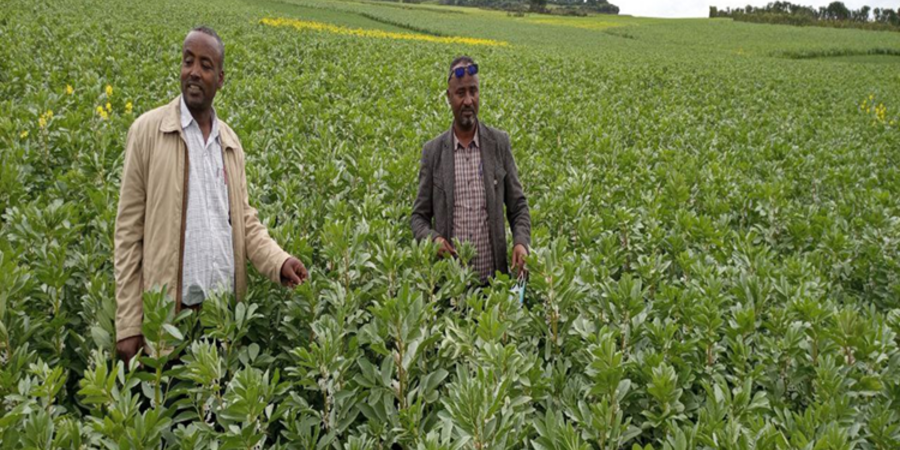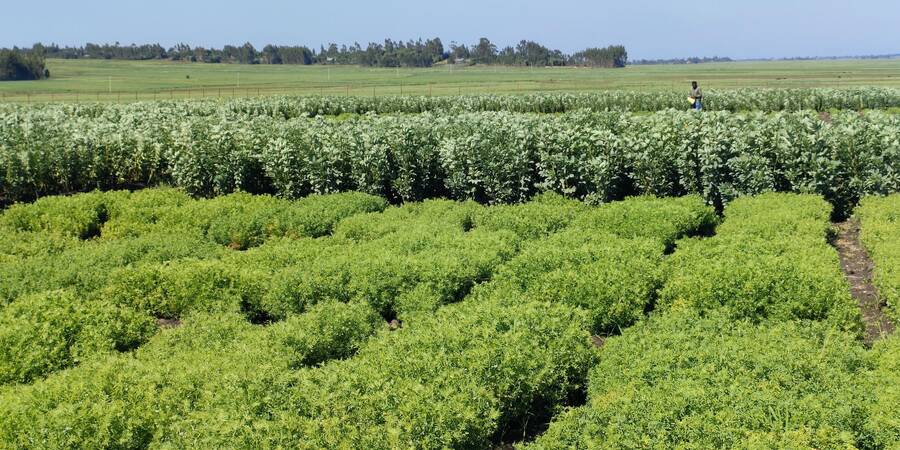Bringing Back Food Legumes in Wheat-Based Cropping System in the Highlands of Ethiopia

By Dr. Seid Ahmed Kemal, ICARDA Legume Pathologist
This work is part of the Africa Research In Sustainable Intensification for the Next Generation (Africa RISING) program supported by the American people delivered through the USAID Feed the Future initiative.
In Ethiopia, bread wheat is the third most important cereal crop after maize and teff for domestic food products (64%), and farmer incomes (24%). Wheat straw is also an important animal feed source. The government of Ethiopia already imports huge amounts of wheat. To fulfil the increasing wheat demand, the government of Ethiopia is expanding irrigated wheat production besides narrowing the yield and quality gaps of rainfed wheat. To capitalize, many farmers have turned to unsustainable monocropping, which exposes large wheat growing areas to disease epidemics due to the reduction of genetic diversity and repeated depletion of soil nutrients. ICARDA’s successful approach to sustainable wheat production is diversifying the wheat-based cropping system by bringing back previously shelved high-yield and disease-resistant food legume varieties into the production system.

Since 2012, ICARDA, within the Africa RISING project, has targeted the sustainable intensification of wheat-based production systems in the highlands of Ethiopia to meet increasing demands of cereals and food legumes. To ensure the crop innovations are adopted, ICARDA first validates preferred food legume varieties with farmers, then supports early-generation seed production systems, and then addresses the scaling of adopted approaches together with demand and scaling partners. The project utilizes varieties of four crops released by the national agricultural system in four project sites that represent diverse agroecologies of the country. Both women and men farmers evaluated the varieties at crop maturity, and the preferred varieties were then multiplied and made available via community seed producers.

As climates warm, pests and weeds proliferate, and crops, including Ethiopian highland pulses like faba bean, lentil, chickpea and faba bean, are now threatened by new and emerging parasitic weeds and fungal and viral diseases. The Food and Agriculture Organization of the United Nations (FAO) estimates that pests and diseases affect around 40% of the world's crops annually. Pest and disease outbreaks that wipe out a global staple crop are a catastrophe that ICARDA gravely fears and believes is not implausible, especially if intensive monocropping continues in wheat-based cropping systems.
For more than 45 years, ICARDA has joined forces with national and international partners across the region to strengthen technology generation, scaling and capacity building in the area of food legumes. Given the threats of climate and farming systems changes and global shocks such as conflict and economic crises, food legumes are becoming critical for food, income, soil health and animal feed.
This work is part of the Africa Research In Sustainable Intensification for the Next Generation (Africa RISING) program supported by the American people delivered through the USAID Feed the Future initiative.



